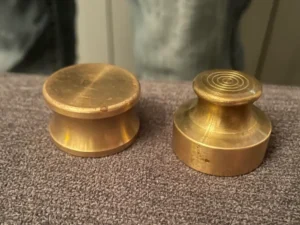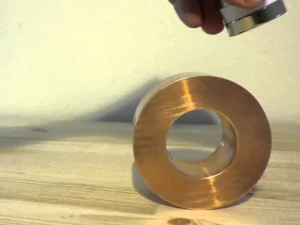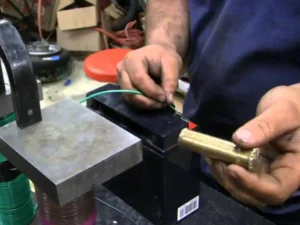Brass is used in many industries. Many manufacturers consider it a precious entity due to its corrosion resistance feature. However, many people don’t know about brass’s magnetic behavior. This leads us to write a dedicated guide on: is brass magnetic?
No, brass does not exhibit any magnetic behavior. It is an alloy made from copper and zinc. Both of these materials have pair electrons in orbitals. This paired electron spin cancels the magnetic movement. Due to this, brass weakly repelled when brought to the magnetic field.
The mechanism of the magnetic behavior of brass is complex. It requires an understanding of how magnetism is produced. So, let’s dive in and discuss the mechanism and gain complete insight into the magnetism of brass alloys.
Overview of Magnetism

Magnetism is a phenomenon in which one material attracts or repels another material. This happened due to the charges present inside the materials. Every material can exhibit different magnetic behavior. It mainly depends on the number of paired or unpaired electrons in orbitals.
Before going into the magnetic behavior of brass, let’s first understand magnetism itself. There are different types of magnetism. Those include paramagnetism, diamagnetism, and ferromagnetism. But how can we check if a material is paramagnetic or diamagnetic?
This testing can be done by bringing the material close to the magnet. In paramagnetism, material is weakly attracted to the magnet. A material exhibiting this behavior contains unpaired electrons in the orbital. In diamagnetism, the material is weakly repelled from the magnet.
Diamagnetic materials contain paired electrons in the orbital. The opposite spin of these electrons cancels the magnetic moment. Therefore, these materials are not attracted to magnets. Last but not least, ferromagnetic material contains unpaired electrons.
They are strongly attracted to the magnet. Examples include iron, cobalt, and nickel. The brass itself is diamagnetic and does not get attracted to magnets. It is preferred when no magnetism is needed in any part. Let’s go down and discuss the logic behind the non-diamagnetic behavior of brass.
Why is Brass Not Magnetic?

To understand the non-magnetic behavior of brass, first, you should understand its composition. Brass is an alloy element made from copper and zinc. Different compositions of these two elements can create various types of brass. However, these two minerals, zinc and copper, are common in all kinds.
Both zinc and copper have paired electrons in the orbitals. For example, the 3d orbital of copper is filled with two paired electrons. Similarly, the 4s orbital of the zinc has paired electrons. These pair electrons cancel each other’s spin as both are opposite. Due to this, the magnetic moment gets canceled.
The brass does not show any particular magnetic behavior when there is no magnetic moment. Remember that magnetism is produced when the electrons don’t cancel each other’s spin. So, they align in one direction and get attracted to the magnet. In the case of brass, electrons are paired, and they cancel their opposite spin.
Can You Pick up Brass with a Magnet?
No, you can never pick up brass with a magnet. Even if you bring a magnet close to the brass, it won’t show any attraction towards it. The reason is that brass is non-magnetic. Neither brass goes towards the magnet, nor does the magnet stick with the brass.
You’ll only be able to pick those materials that have managed properties. Due to their unpaired electrons, the magnetic moment is produced. This moment induces the magnetic properties of the material. As a result, it sticks to the magnet. However, the brass has no unpaired electrons. Therefore, you cannot pick with a magnet.
Can you Magnetize Brass?

Brass is highly non-magnetic. It has filled orbitals, and there is no magnetic moment. However, by applying some techniques, you can still magnetize brass. Those tricks include electromagnetism and alloying. Let’s discuss how these methods work:
1- Electromagnetism
In this method, a current is passed through the brass. This electric current disturbs the electronic configuration of both copper and zinc. As a result, the paired electrons are affected for a short period. So, the magnetic field is produced around the brass, magnetizing the material.
This is done by applying a copper wire around the brass material. The copper wrapped in the battery is then connected to the battery. This battery connection provides current to the brass. When this setup works, current flows, and a magnetic field are produced. Due to a disturbance in electron balance, the material exhibits magnetic behavior.
2- Alloying or Impurities
It is essential to understand that brass is non-magnetic in its purest form. However, if it contains impurities, its magnetic behavior can be altered. Therefore, people add impurities or any other magnetic material to brass in traces. This addition is good enough to change magnetic behavior.
Iron and nickel are mainly used as impurities. Both of these elements have excellent magnetic properties. When added to brass, they impart their properties, which makes it magnetized. Other methods can also magnetize brass. Examples include the annealing process. Moreover, you can magnetize the brass by putting it under extremely low temperatures.
Factors Affecting Magnetism of Brass
As I said earlier, brass is non-magnetic in its pure form. However, some additional factors influence the magnetism of brass. Let’s go down and discuss those vital factors:
1- Composition
This factor has already been discussed in the above section. Brass is composed of copper and zinc. Both of these two materials contain no unpaired electrons. So, the brass itself is also non-magnetic. However, when this composition of the brass alters, its behavior also changes.
For example, if brass contains nickel impurities, it will become magnetized. Nickel has unpaired electrons, which produce magnetic movement. Due to this, a magic field is created around the brass.
Point to Highlight: Brass is 100% non-magnetic in its pure form. If you want a slight magnetic advantage, you can alter the composition of this material. However, if magnetism is not needed, you use the pure form of brass.
2- Temperature
Temperature is another factor that influences the magnetic behavior of brass. When this material is subjected to high temperatures, its magnetism decreases. The reason is that temperature provides enough energy to the brass.
This added energy is so much that it can alter the electronic configuration of copper and zinc. When the temperature is highly reduced, the brass becomes magnetized. However, it is essential to note that this effect of temperature is short-lived. You cannot expect a performant change in the magnetic behavior of brass.
3- Magnetic Field Exposure Mechanical Processing
Both magnetic field and processing also affect the magnetism of brass. If you put a magnet close to brass, it will create a strong magnetic field around itself. This super-strong field can alter the properties of any material that comes in its way.
However, this magnetism induced in brass by the magnetic field is temporary. Mechanical processing, including hammering and shaping, to change the electronic configuration. Due to electronic disturbance, the magnetic behavior of brass can be affected.
If extreme stress is applied and deforms the material, the chances of magnetism increase. So, if you want your brass to exhibit some magnetism, subject it to mechanical processing. Mechanical processing is not just stress and deformation. Heating, annealing, cooling, etc, are also part of it.
What is the Importance of Non-Magnetic Brass?
Brass has many advantages. Its usage in the form of brass bars is getting more common day by day. Due to its non-magnetic behavior, it is also widely used in medicine industries. Have you ever seen MRI machines? They are typically made from brass. The reason is that this material does not interfere with the magnetic field.
Due to its strength and corrosion resistance, almost all industries use brass, from aerospace to automobiles. Brass offers excellent performance even in moist conditions, and parts made from it don’t attract magnets.
Do you know that brass is preferred in the musical industry? Many tools are made from brass. Those include trumpet, trombone, horns etc. The reason is that brass offers a very resonant and clear sound. Even many professional singers use musical instruments made from brass alloy.
Other plus points include the pleasing look and durability. Products or instruments made from brass can stay in good shape for years. Durability is one of the top features of brass. Due to all these benefits, brass is considered a superior option. It is an inexpensive replacement for many premium materials.
Frequently Asked Questions
Can magnets stick on brass?
No, magnets don’t stick on brass due to the non-magnetic nature of this alloy. The critical point to highlight is that this alloy is made from copper and zinc. Both of these materials have paired electrons, which cancel the magnet moment. As the magnetic moment is zero, the magnetic behavior is also zero.
How can you tell if it’s brass?
You can test by either looking at it with your naked eyes or testing it with a magnet. It is not attracted toward a magnet when placed near it; it indicates it is brass. Moreover, brass has an attractive golden-yellow color, which is another sign.
Which Brass is Magnetic?
Pure brass is always non-magnetic. However, brass with some impurities, such as nickel, can be magnetic. In short, brass with some impurities is magnetic.
Does brass corrode easily?
No, it does not rust and has excellent corrosion resistance compared to other metals. However, if it remains unchecked for years, it will also get some rust. If you use it carefully, it will be in good shape for years.
Conclusion
Brass is a well-known alloy. It exhibits many excellent properties. However, it is not magnetic, which means a magnet has no impact on it. You cannot pick it with a magnet like iron or nickel materials. This guide covers all things related to brass’s magnetism. Apart from magnetism, its durability and corrosion resistance are points to look for.
